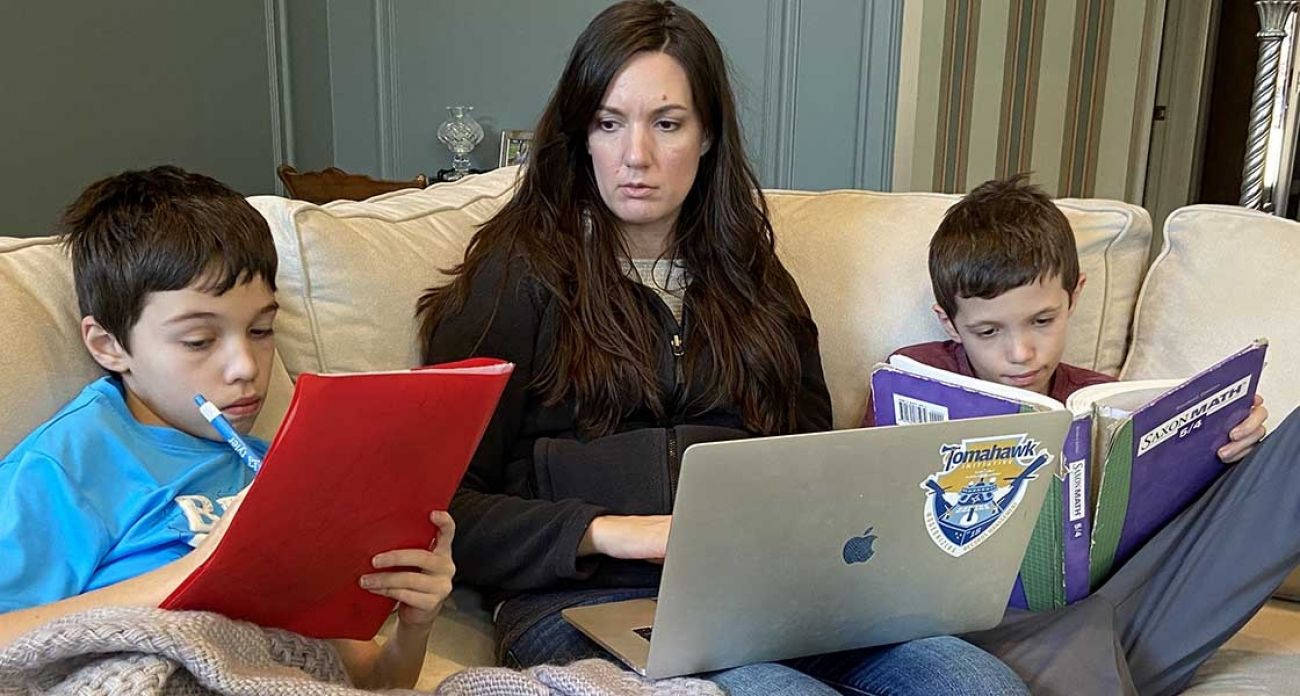Michigan poll: Coronavirus break hurts kids, but don’t order more school

Nearly two-thirds of Michigan parents say they’re concerned about the negative impact school shutdowns are having on learning during the coronavirus crisis, according to a poll conducted by Bridge Magazine and Public Sector Consultants.
But not concerned enough to support forcing their children to spend additional time in school when classrooms reopen. Only 34 percent of parents of K-12 students polled listed mandatory summer school or a longer school year as their top choice for mitigating academic damage caused by the pandemic school closures.
The poll, of 800 parents, also found families offering mixed reviews on the quality of remote learning being offered to students. And half of households surveyed lost income to spend time helping their children with homebound assignments.
- The latest: Michigan coronavirus map, curve, chart, updated COVID-19 news
- Michigan’s latest stay-home order to allow landscaping, boating and golf
- What Gov. Gretchen Whitmer’s stay-at-home executive order means to Michigan
Still, an overwhelming majority of parents surveyed supported Gov. Gretchen Whitmer’s decision to close schools for the remainder of the school year in an effort to slow the spread of the potentially deadly coronavirus. That support was consistent among Democrats, Republicans and Independents.
The poll, conducted April 13-20, offers an in-depth look at how families view the state’s classroom closures, remote learning and options for learning in the fall. The poll has a margin of error of between 2.5 percent and 3.5 percent.
After seeing the poll results, Pamela Pugh, a Democratic member of the State Board of Education, said in an email to Bridge, “it is understandable that parents are concerned that the instruction delivered, using unprecedented measures during this time of an unprecedented crisis that is impacting so many, will not be comparable to that delivered in a normal school setting.
“I share in the hopes and prayers of these parents that our children can return to their normal school environments starting in the fall,” Pugh said. “I too know that our first priority must be the health and safety of our children."
- Six in 10 parents are concerned or very concerned about the health of their families due to the coronavirus pandemic; 17 percent were not concerned.
- Seven in 10 agree with Whitmer’s decision to close K-12 classrooms for the remainder of the school year and switch to remote learning; just 8 percent disagreed.
- Though a majority agreed it was a good idea to close schools and switch to remote learning 64 percent are concerned about the negative impact school closures have on learning; 18 percent said they weren’t concerned.
- Parents are split on the quality of learning taking place at kitchen tables around the state. About 37 percent said the quality of learning was lower than in classrooms, with 37 percent saying it was similar and 25 percent saying it was better.
- 45 percent said someone in the household had reduced their hours of employment as a result of children being home during the school closure; 50 percent said their household income had declined.
- One in 10 families said a K-12 student in their household had not received any remote learning material at the time this survey was taken, five weeks after schools closed. Eighty-one percent said their children were getting at least some learning online, and 38 percent received at least some printed materials from their schools.
School leaders are huddling across the state to strategize how to mitigate the anticipated learning loss from being out of classrooms for six months. The Bridge/PSC poll suggests policymakers may have a heavy lift winning public support if they attempt to boost classroom hours when schools reopen.
Given four options to boost student learning when schools resume, 34 percent supported some form of mandatory additional education. The breakdown:
- 48 percent prefer a normal school year starting in the fall;
- 22 percent support extending the next school year by 15 days (to 195 days instead of 180) to make up for learning loss from school closures;
- 16 percent support optional summer school;
- 12 percent want mandatory summer school
Some other results from the poll:
When parents were asked to pick their top choice from among five remote learning options, there was one clear response: Parents don’t want their kids to “play hooky” during home learning. Just 4 percent of poll respondents said they would prefer schools not provide school work for their children during the pandemic closure.
Among other choices:
- 21 percent of parents want remote learning homework graded, and an equal percent wanted schoolwork, but didn’t want grades given during homebound remote learning.
24 percent said they wished schools would offer as many hours of remote learning instruction as offered in classrooms (work varies by district, but elementary-aged students typically receive 1-3 hours of remote instruction).
19 percent wanted instruction less focused on academics, and more emphasis on the emotional needs of children during the pandemic.
There are large disparities in remote learning among local school districts, both in how remote learning is presented (online or in printed packets), and whether assignments are receiving grades. Those differences raise concerns among some education leaders about the possibility of learning gaps growing in the six months between the March shutdown and September’s traditional reopening.
Parents, though, don’t seem to want a state-imposed solution. Forty-eight percent of surveyed parents prefer remote learning be developed by local school districts rather than the state, compared to 14 percent who said they’d prefer standardized remote learning guidelines established by the state.
Dan Quisenberry, president of the Michigan Association of Public School Academies, which represents the state’s charter schools, said it’s important for educators to understand the experiences parents are having with remote learning.
“This kind of information going forward will help inform educators how best to educate kids and keep them safe,” he said.
“As schools plan for next fall, given all the unknowns, providing the highest quality education possible will continue to be the priority,” Quisenberry said.
“Safety is also a priority. So, once schools can decide to reopen buildings, hearing parents’ concerns and communicating safety protocols will be very important.”
RESOURCES:
- Hey, Michigan, here’s how to make a face mask to fight coronavirus
- Michigan coronavirus dashboard: cases, deaths and maps
- Michigan families can get food, cash, internet during coronavirus crisis
- How to give blood in Michigan during the coronavirus crisis
- 10 ways you can help Michigan hospital workers right now
- Michigan coronavirus Q&A: Reader questions answered
- How to apply for Michigan unemployment benefits amid coronavirus crisis
Michigan Education Watch
Michigan Education Watch is made possible by generous financial support from:
Subscribe to Michigan Education Watch
See what new members are saying about why they donated to Bridge Michigan:
- “In order for this information to be accurate and unbiased it must be underwritten by its readers, not by special interests.” - Larry S.
- “Not many other media sources report on the topics Bridge does.” - Susan B.
- “Your journalism is outstanding and rare these days.” - Mark S.
If you want to ensure the future of nonpartisan, nonprofit Michigan journalism, please become a member today. You, too, will be asked why you donated and maybe we'll feature your quote next time!






